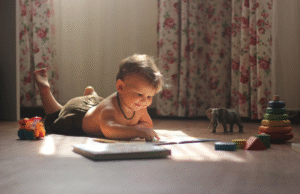The first day of school often arrives with a blend of excitement and anxiety. There’s the smell of freshly sharpened pencils, the anticipation of new routines, and the thrill of watching your child step forward into a world that promises growth. Yet, while your child may walk confidently into their new classroom, many parents are left fighting back unexpected emotions sadness, worry, and even grief.
It’s not uncommon for the start of school to affect parents more deeply than the children themselves. In fact, this transition can become a profound emotional reckoning for mothers and fathers alike — marking the end of a cherished chapter, igniting fears about letting go, and forcing the uncomfortable realization that your child’s world is expanding beyond your arms.
This article explores why this milestone is often more emotionally intense for parents, how to manage the internal transition, and how to honor this moment with strength, grace, and perspective.
Why Starting School Can Hit Parents So Hard
While we often prepare children with school visits, orientation days, and pep talks, parents rarely receive guidance on how to emotionally cope when their little ones take this enormous leap. Here are the most common — and valid — reasons why the experience can feel deeply unsettling for caregivers:
1. It Signifies the End of an Intimate Era
The early years of parenthood are defined by closeness shared routines, first milestones, constant presence. When school begins, so does a new rhythm. You’re no longer the only teacher in their life. You’re sharing your child with the world, and that shift can feel like a loss, even if it’s wrapped in pride.
2. A Sense of Emotional Displacement
As a parent, much of your identity may have been shaped by daily caregiving. Suddenly, your days feel emptier. Your presence feels less central. That emotional displacement the feeling that your role has shifted in a way you didn’t fully prepare for can stir discomfort and even grief.
3. Loss of Control and Protection
Sending your child to school is an act of trust. You’re placing their well-being, social development, and safety into the hands of others — teachers, classmates, and an unfamiliar environment. This loss of control can trigger parental anxiety, especially if you’re naturally protective or have had negative school experiences yourself.
4. You’re Confronting Time — And Its Passage
Few moments highlight the passage of time more sharply than your child putting on a school uniform or waving goodbye at the school gate. Suddenly, the baby you rocked to sleep isn’t a baby anymore. This emotional confrontation with time can be jarring, even for the most stoic parent.
What Parents Often Feel (But Don’t Say)
Many parents suppress these feelings, brushing them off as overreactions. But naming these emotions is the first step to processing them:
- Sadness — Mourning the end of constant closeness
- Anxiety — Worrying about bullying, separation, or emotional strain
- Guilt — Wondering if you’ve done “enough” to prepare them
- Jealousy — Feeling replaced by teachers or peers
- Uncertainty — Not knowing what your new role will look like
All of these are normal. And more importantly, none of them make you a bad parent. They make you a loving one.

How to Cope When the Separation Feels Harder on You
1. Accept That This Is a Transition for Both of You
Starting school isn’t just your child’s milestone — it’s yours, too. Give yourself permission to feel. You don’t need to “toughen up” or pretend it’s easy. Feelings are not weakness — they are acknowledgment.
2. Redefine Your Role Without Diminishing It
Your role is changing, not ending. You are no longer the only voice they’ll hear, but you’ll always be their loudest cheerleader. Find ways to stay involved:
- Helping with school projects
- Reading school notices
- Celebrating little achievements they bring home
These acts of presence will keep the bond strong.
3. Establish Meaningful Rituals
Rituals ground both you and your child emotionally. Consider:
- A consistent goodbye phrase
- A shared breakfast tradition
- Drawing a small heart on their hand they can “press” when they miss you
These tokens of connection offer emotional continuity.
4. Fill the Space With Purpose, Not Just Productivity
Use the newfound quiet hours to reflect, rest, or rediscover yourself. Whether it’s starting a new project, going for walks, returning to hobbies, or simply pausing to breathe, this time can be regenerative.
5. Journal the Journey
Keep a notebook or digital log of your emotions. Write about the first day, the bittersweet moments, your hopes and fears. In time, this becomes a meaningful record — not just of their journey, but of yours.
6. Talk to Other Parents
You are not the only one struggling, even if others aren’t saying it aloud. Parent groups, social media forums, and school networks can be valuable spaces to share stories and support one another.
7. Focus on Their Confidence, Not Your Concern
If your child is adjusting well, embrace it. It’s a sign you’ve raised a child who feels secure enough to explore. Let their resilience mirror your own. Trust the foundation you’ve built.
Final Thoughts: This Moment Is Not the End — It’s a Beginning
Your child starting school is a pivotal life event — not just for them, but for you. It is the moment where you must balance protection with permission, presence with distance, and love with release.
The ache you feel isn’t weakness — it’s a testament to how deeply you’ve loved, nurtured, and guided. And though this chapter is shifting, your importance has not.
You’re still their safe place. You’re still their home.
And this new school journey? It’s not pulling you apart — it’s growing the space between you into something even stronger: trust.
Faqs
1. Is it normal to feel emotional or anxious when your child starts school?
Yes, absolutely. Many parents experience a range of emotions—pride, sadness, anxiety, even guilt—when their child starts school. These feelings are normal and often reflect your deep attachment and the reality that your role as a parent is evolving. It’s a significant milestone not just for your child, but for you too.
2. How can I manage separation anxiety as a parent?
Managing your own separation anxiety starts with acknowledging your emotions without judgment.
- Talk to other parents or a counselor
- Focus on the positives—your child is growing and learning
- Establish a simple goodbye routine
- Avoid lingering or returning once you’ve said goodbye
Children take emotional cues from you—so the more calm and confident you appear, the more secure they’ll feel.
3. What can I do if I feel like I’m losing connection with my child?
Starting school doesn’t mean losing connection—it’s just a shift. Strengthen your bond by:
- Asking open-ended questions about their day
- Creating evening rituals (storytime, walks, dinner talks)
- Showing up for school events and celebrating small wins
Quality time matters more than quantity—consistent presence keeps your bond strong.
4. How do I avoid projecting my own fears or past school experiences onto my child?
Be mindful of your own inner narratives. If you had a tough time at school, that doesn’t mean your child will. Let them build their own experiences. Focus on encouraging exploration, confidence, and curiosity—your child deserves a fresh start, and so do you as a parent.
5. How do I know if my child is truly adjusting well—or just putting on a brave face?
Watch for patterns in behavior. A child who is adjusting well will:
- Talk about school (even briefly)
- Eat and sleep normally
- Show enthusiasm for certain activities or friends
If your child seems persistently withdrawn, irritable, or has physical symptoms like stomachaches, gently ask questions and stay connected with their teachers. Trust your instincts—and don’t hesitate to seek support if something feels off.



